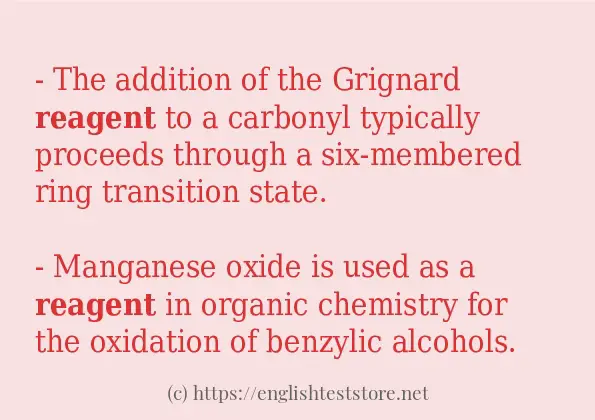How to use in-sentence of “reagent”:
– The addition of the Grignard reagent to a carbonyl typically proceeds through a six-membered ring transition state.
– Manganese oxide is used as a reagent in organic chemistry for the oxidation of benzylic alcohols.
– The reagent may also react with oxygen present in the atmosphere.
– In cases where the Grignard reagent is adding to a prochiral aldehyde or ketone, the Asymmetric inductionFelkin-Anh model or Cram’s Rule can usually predict which stereoisomer will form.
– It is used as a reagent for many chemicals, such as alcohol.
– The Grignard reagent is very useful for forming carbon–heteroatom bonds.
– A portion of a previous batch of Grignard reagent is often used as the initiator.

Example sentences of “reagent”:
- In chemical ionization, a reagent gas, typically methane or ammonia is put into the mass spectrometer.
- The reducing reagent gives an electron to have a net negative charge.
- Grignard reactions will not work if water is present; water causes the reagent to rapidly decompose.
– In chemical ionization, a reagent gas, typically methane or ammonia is put into the mass spectrometer.
– The reducing reagent gives an electron to have a net negative charge.
– Grignard reactions will not work if water is present; water causes the reagent to rapidly decompose.
– In Negative Chemical Ionization the reagent gas decreases the impact of the free electrons on the target analyte.
– If the concentration of one reagent is kept at the same high value then it can be thought of as a constant.
– A reagent bottle is a bottle designed to hold chemical liquids and solution for long-term storage.
– Atmospheric humidity can alter the yield yield of making a Grignard reagent from magnesium turnings and an alkyl halide.
– This can addressed by using a dual Grignard system with a cheap reducing Grignard reagent such as n-butylmagnesium bromide.
– It is used as a reagent in a reaction in organic chemistry.
– In Positive Chemical Ionization the reagent gas interacts with the target molecule, most often with a proton exchange.
